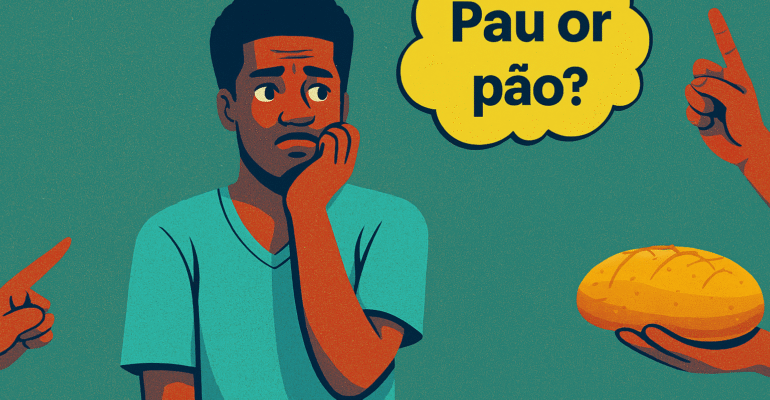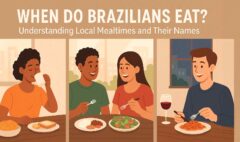‘Pão’ vs ‘Pau’: Avoid This Awkward Portuguese Mistake
‘Pão’ vs ‘Pau’: Avoid This Awkward Portuguese Mistake
Let’s take two small but crucial words to illustrate why nasal sounds are essential in Portuguese:
✔️ Pão = Bread
✔️ Pau = Stick/Wood (but in slang… it can also mean penis 😬)
Now, imagine this: You walk into a café in Brazil and say:
👉 “Oi, por favor, eu quero um pau com manteiga.”
Oops! You just asked for “penis with butter” instead of “bread with butter”. 😅
While most Brazilians would understand what you meant, mastering nasal sounds can help you avoid embarrassing moments and speak with confidence.
So… What Makes a Sound Nasal?
Nasal sounds in Portuguese happen in two main ways:
1️⃣ Words with a tilde (~) over a vowel, like pão or coração.
2️⃣ Words ending in “m” or “n” (unless followed by a vowel), like bom or sim.
The tilde (~) is called a til (pronounced teel), and it gives vowels a distinct nasal resonance.
For English speakers, nasal vowels aren’t common, so they can be tricky at first. But don’t worry—once you start listening closely, you’ll hear the difference!
Examples of Nasal Sounds
Here are some common nasal sounds in Portuguese, with pronunciation tips:
✔️ Pão (bread): The nasal ão sounds a bit like “own” in English but with a stronger nasal tone.
✔️ Mãe (mother): The nasal ãe is similar to the “ay” in say, but with that nasal twist.
✔️ Cão (dog): Again, the ão is nasalized—think of “own” in stone, but let your nose do more of the work.
Mastering Nasal Sounds
The more you practice, the clearer your pronunciation will become. And the better you get at nasal sounds, the easier it will be to avoid awkward double meanings.
So next time you’re in a café or chatting with a Brazilian friend, remember:
✅ Pão com manteiga (bread with butter)
❌ Pau com manteiga (let’s not even go there… 😂)
Want to Avoid More Portuguese Mistakes?
We’ve got you covered! 📘
Check out our book on Amazon, where we reveal more common Portuguese blunders and how to avoid them like a pro! 🚀

Learn Portuguese the Brazilian Way! 🇧🇷✨
At The Brazilian Ways, we believe language learning should be fun, immersive, and deeply connected to culture. Our unique courses help you speak Portuguese naturally while experiencing Brazil through its music, films, literature, and dance.
🎶 The Brazilian Music Club – Learn Portuguese through the rhythm and lyrics of Brazilian music.
🎬 The Movie Club – Improve your Portuguese while exploring the best of Brazilian cinema.
📖 The Short Story Club – Enhance your skills by diving into Brazilian literature.
💃 Portuguese for Zouk – Connect with the Zouk dance community while learning Portuguese.
✨ Join a vibrant community of learners and experience Brazil through language!
👉 Explore our programs and start today! 🚀
📲 Follow us on Instagram for more engaging content, language tips, and cultural insights: @thebrazilianways













